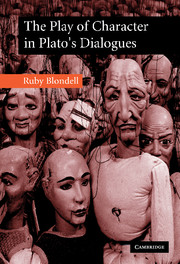Book contents
- Frontmatter
- Contents
- Preface
- 1 Drama and dialogue
- 2 The imitation of character
- 3 The elenctic Sokrates at work: Hippias Minor
- 4 A changing cast of characters: Republic
- 5 Reproducing Sokrates: Theaetetus
- 6 Putting Sokrates in his place: Sophist and Statesman
- Bibliography
- General index
- Index of passages cited
4 - A changing cast of characters: Republic
Published online by Cambridge University Press: 22 September 2009
- Frontmatter
- Contents
- Preface
- 1 Drama and dialogue
- 2 The imitation of character
- 3 The elenctic Sokrates at work: Hippias Minor
- 4 A changing cast of characters: Republic
- 5 Reproducing Sokrates: Theaetetus
- 6 Putting Sokrates in his place: Sophist and Statesman
- Bibliography
- General index
- Index of passages cited
Summary
Republic provides a unique crucible for examining the relationship between the figures of Sokrates that I have called “elenctic” and “constructive,” and their interactions with others. The fracture line in his character between Books 1 and 2 allows us to examine the relationship between these two different avatars of Sokrates on the basis of the internal structure of a single work, without making any assumptions or inferences about the relative chronology of various dialogues. This remains true regardless of the circumstances of Republic's composition. I do not share the view that Book 1 was written earlier as a separate dialogue. But this issue is irrelevant to interpretation of the mature work as a whole. Since Books 2–10 are structurally a continuation of Book 1, we may expect the stylistic changes they present to tell us something about Plato's own shifting attitudes towards philosophical method and its literary expression. I shall begin this chapter, then, by looking at the dramatis personae of Book 1, in which the elenctic Sokrates faces three varied interlocutors, before turning to the radically different dramatic style of the rest of the work and considering some possible reasons for this transformation.
socratic testing: three responses
The conversation takes place on a summer evening in the house of Polemarchos, son of Kephalos, at Peiraeus (328b). Sokrates is there, as he tells us in the dialogue's famous opening words, for the first Athenian festival of “the goddess,” usually thought to be the Thracian goddess Bendis (327a; cf. 354a).
Information
- Type
- Chapter
- Information
- The Play of Character in Plato's Dialogues , pp. 165 - 250Publisher: Cambridge University PressPrint publication year: 2002
